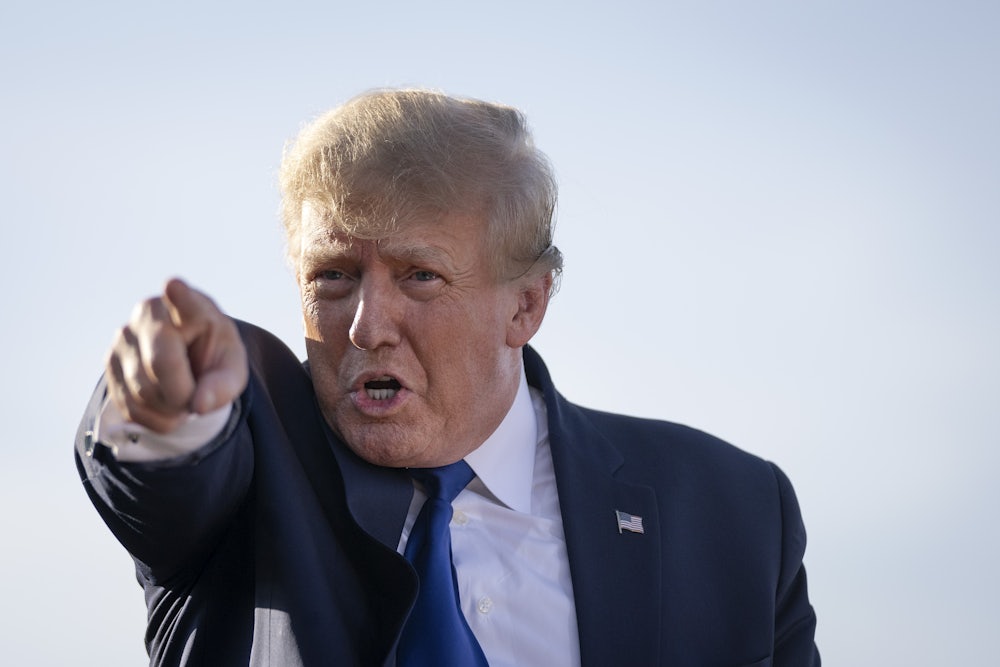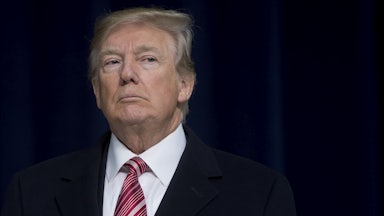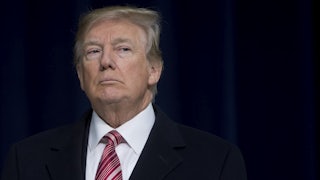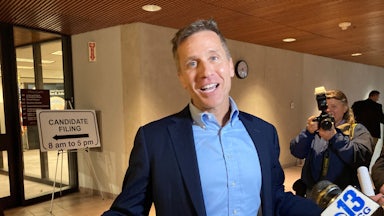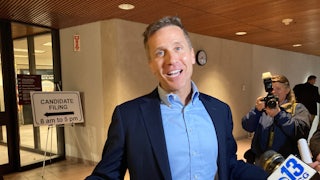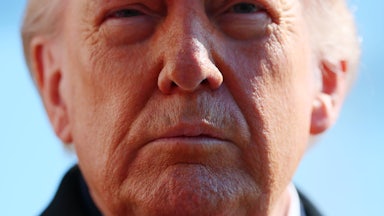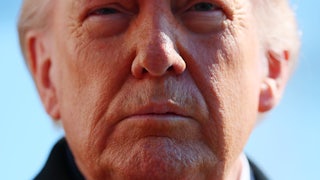Donald Trump has never been known for being a “details guy,” but there came an occasion this past Monday when he was laser-focused and determined to get the small stuff exactly right. Picture the scene: There’s the once and future GOP standard-bearer, sweating over a last-minute endorsement in Missouri’s senate primary. Here, Trump faced a real dilemma. His clear favorite in the race, disgraced former Governor Eric Greitens, was collapsing in the polls as more and more voters came to be continually reminded of the revenge porn, domestic violence, and campaign finance scandals that forced him to resign. Meanwhile, the front-running state Attorney General Eric Schmitt had refused to say whether he would vote for Mitch McConnell to continue as the GOP’s leader in the senate—a position that was quickly emerging as a red line for Trump.
But as Trump puzzled over the conundrum at his Bedminster, New Jersey, golf club, there came a breakthrough—a minor detail that no one had hitherto noticed: Greitens and Schmitt have the same first name. Couldn’t Trump just endorse “Eric” and claim credit as long as one of them wins? Per Politico:
It was a madcap exit ramp. But Trump went in on the details, asking if the two candidates’ first names were spelled identically—noting that it wouldn’t work if they weren’t. While Trump was intrigued, he also remarked that it might be too cute. He asked for draft endorsements to review, one announcing his support for Schmitt, the other for Greitens.
This is absolutely one of the funniest paragraphs you’ll read in the news this year. Trump “went in on the details”—to make sure that one of the candidates didn’t spell their first name with a k. It was a “madcap exit ramp” because … let me check my notes here … ah, yes, because Trump wasn’t aware of how these two men, major figures in Republican politics in Missouri, spelled their names until he was finally set to offer his endorsement.
It’s been a long, long year, during which time the question of Trump’s coattails and his power as a kingmaker has been endlessly fretted over. What this charade illuminates is what a waste of time all that cogitation has been: This is how little thought goes into Trump’s endorsement strategy. Trump only cares about loyalty; his one goal is to ensure that he can claim fealty from whoever emerges as the party’s nominee. There are some disqualifying metrics—anything less than fawning praise will damn them; hatred for Mitch McConnell is strongly preferred. But ultimately Trump just wants to be able to claim that he and he alone was responsible for their victory in both the primary and general elections. In the end, any old Eric will do.
There have been instances in which Trump’s endorsement likely played a decisive role in the outcome—he helped lift J.D. Vance to victory in Ohio’s gubernatorial primary and Dr. Oz in Pennsylvania’s GOP senate contest. But there have been few elections since those marquee wins where you could assuredly cite Trump’s potency as a national political force as the difference maker. In many instances, Trump’s presence in the race has been as radioactive for the GOP as it was in the 2018 midterm elections. The Republican Party’s high-water mark since then came in a race where Virginia Governor Glenn Youngkin went to considerable lengths to keep Trump at arm’s (or at least elbow’s) length from his campaign. Ultimately, Trump’s been a mixed bag this year, leaving analysts with a chicken and egg–type conundrum as they try to assess his political dexterity and influence. The good news is that in the end, there’s a simple rubric for Trump: He cares most about not being seen as a loser.
In Missouri, his prerogatives couldn’t be clearer. This was not an endorsement at all; Trump just gave his blessing to two of the top-three candidates and left Missouri voters to figure it out for themselves. It’s long been clear that his personal preference is Greitens, who has been steering heavily into the MAGA brand. But let’s notice that Trump is afraid to back him outright. He’s worried that Greitens is going to get smoked—something that has seemed increasingly likely in recent weeks. He’s also worried that not backing Greitens will make him look like a squish. Fortunately, the Show Me State showed Trump a way out by giving him a race with two Erics. Now he can claim victory no matter what happens. If every contest were as accommodating to Trump’s needs, he’d pull this stunt again and again.
This is an egregiously cynical and silly way to do politics, but guess what? Trump’s politics have always been egregiously cynical and silly—venal and self-serving as well. Missouri’s primary is on Tuesday, and late endorsements typically don’t have much of an effect on elections. It’s hilarious that Trump couldn’t simply take a pass on weighing in on this contest. But there’s an important takeaway, nonetheless: It wasn’t strength guiding his hand, it was fear—fear that if Greitens somehow pulled out a win, the story would be about how he executed his incredible comeback without the help and support of his natural ally, Donald Trump. Trump’s “Let’s go, Eric!” endorsement is perhaps the dumbest way he could have injected himself into the race. It’s extremely funny. It’s also perhaps the most quintessentially Trumpian thing that’s ever happened.
